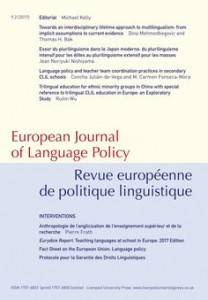The European Journal of Language Policy invites contributions to the thematic number entitled “Languages and international virtual exchange” and planned for autumn 2019. This edition aims to explore the implications of virtual exchange for language policy. It will have a particular concern for the European context but will welcome insights that can be offered by the experience of other areas of the world.
Intercultural exchange has always been an integral part of language learning. When students come into contact with other cultures they develop both intercultural and linguistic competence as well as a wide range of soft skills that are key to preparing for a globally interdependent world. However, study abroad is not feasible for all students – the European objective of 20% mobility in 2020 is a long way off. Virtual exchange, “technology-enabled, sustained, people to people education”[1] is thus a means of providing intercultural, international experience through online projects in formal or informal settings often for contexts where there is little opportunity for mobility or study abroad.
There is currently a sustained push to support and develop virtual exchange in education across Europe and beyond. In 2018, the European Commission launched the Erasmus+ Virtual Exchange initiative for youth across Europe and the Southern Mediterranean with the intention of expanding the reach and scope of the Erasmus+ programme via virtual exchange. According to the Commission, the Erasmus+ Virtual Exchange initiative “is expected to create an engaging and safe online community where young people can participate in facilitated discussions, increase their intercultural awareness and extend their competences”[2]. The target for this initiative is to reach 8000 youth in 2018.
The European Journal of Language Policy/Revue européenne de politique linguistique is a peer-reviewed journal published by Liverpool University Press, in association with the Conseil européen pour les langues / European Language Council. It has appeared twice yearly since 2009, with a record of rapid review and dissemination.
The journal aims to address major developments in language policy from a European perspective, regarding multilingualism and the diversity of languages as valuable assets in the culture, politics and economics of twenty-first century societies. The journal’s primary focus is on Europe, broadly understood, but it is alert to policy developments in the wider world.
The journal invites proposals or manuscripts of articles studying any aspect of language policy, and any aspect of the area of languages for which policies may need to be developed or changed. It particularly welcomes proposals that provide greater understanding of the factors that contribute to policy-making, and proposals that examine the effects of particular policies on language learning or language use.
The journal presents relevant policy documents and reports, particularly where these contribute to debates and decision-making on language policy in Europe and elsewhere. It invites suggestions for such documents.
Articles and other items will be accepted in either English or French. Abstracts of articles will be provided in both languages. Materials may be derived from or refer to texts in other languages. All manuscripts will be subject to peer review and authors may be invited to make revisions.
Further details including authors’ guidelines and code of conduct, can be consulted at:
http://online.liverpooluniversitypress.co.uk/loi/ejlp
Proposals should be sent in the form of an abstract (up to 300 words) and a curriculum vitae (up to 2 pages) to the Editor, Prof Michael Kelly (M.H.Kelly@soton.ac.uk) by Monday 16th April 2018. The final length of manuscripts should be +/- 7000 words, including references, and may be written in English or French. Articles will be required by 1st March 2019.

